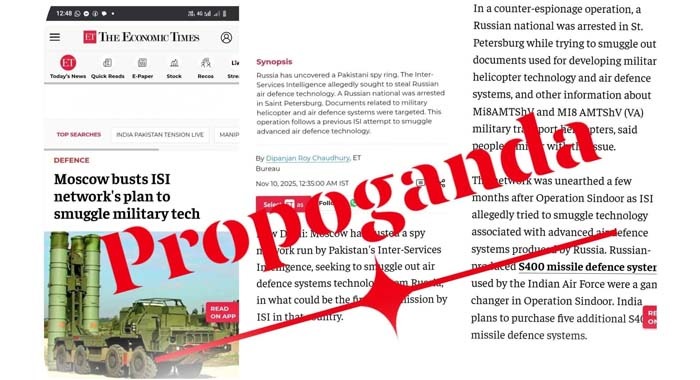A coordinated wave of fabricated stories in several Indian media outlets has falsely claimed that Russian authorities dismantled “Pakistan ISI” in St. Petersburg an allegation that has found no verification from any Russian or international source.
The reports, published almost simultaneously by Economic Times, Firstpost, Republic World and other Indian aggregator websites, cite only “sources familiar with the matter” without providing any official confirmation, documents, or statements from Russian agencies. They attempt to link the alleged “network” to the S-400 air defence system and a purported Indian intelligence operation codenamed Sandor.
An investigation into Russian media archives, including TASS, RIA Novosti, Interfax, RT, and Kommersant, shows zero coverage of any ISI-linked arrest or espionage case in St. Petersburg. These outlets have continued to report on other FSB operations making the absence of this story particularly telling. No Russian court filings, government press releases, or FSB statements reference Pakistan, ISI, or any related matter.
Experts note that the entire narrative appears to have originated within an Indian media cluster, spreading across portals with identical wording and timing an indicator of centrally coordinated disinformation. The pattern mirrors previous propaganda cycles in which Indian outlets circulated unverified claims to malign Pakistan’s security institutions internationally.
Analysts point out that such fabricated stories are typically framed to reinforce India’s strategic messaging against Pakistan, often tying unrelated international developments to its domestic narratives. By invoking Russia’s S-400 technology and referencing India’s own intelligence operations, the campaign seeks to project false equivalence and distract from India’s controversial espionage activities recently exposed in Western countries.
No Russian official, diplomat, or reputable news organization has supported or even acknowledged the Indian allegations. The absence of independent verification underscores that the story is a complete fabrication an example of India’s expanding information warfare strategy targeting Pakistan.
Observers warn that the rapid 12–24-hour proliferation of identical reports across Indian portals demonstrates how state-aligned media networks in India are being used to amplify coordinated propaganda designed to influence international opinion and distort Pakistan’s image abroad.





